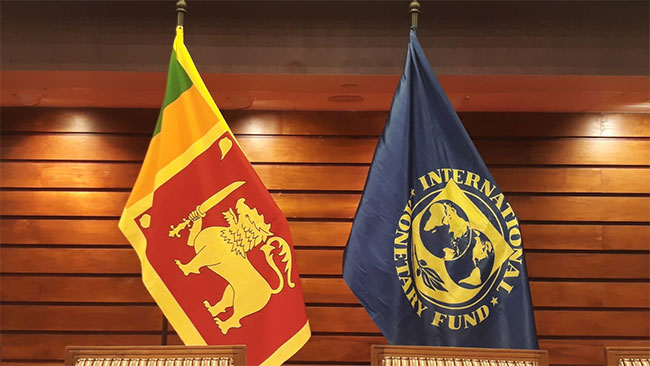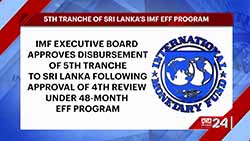Sri Lanka’s economic outlook remains positive but global trade policy uncertainties pose significant risks: IMF
July 3, 2025 05:32 pm
Sri Lanka’s economic outlook remains positive, however, global trade policy uncertainties pose significant risks to the country’s macroeconomic and social stability, the International Monetary Fund (IMF) has stated.
On July 1, 2025, the Executive Board of the IMF completed the Fourth review under the 48-month Extended Fund Facility (EFF) Arrangement, allowing Sri Lanka to draw approximately US$350 million.
This brings the total IMF financial support disbursed so far to approximately US$1.74 billion.
According to the IMF, performance under the program has been generally strong with some implementation risks being addressed.
Prior actions on restoring cost-recovery electricity pricing for the rest of 2025 and operationalizing automatic electricity tariff adjustment were met by the government, the IMF noted.
“All quantitative targets for end-March 2025, except the stock of expenditure arrears, were met. All structural benchmarks due by end-May 2025 were either met or implemented with delay. 2025Q2 inflation fell below the lower outer band of the Monetary Policy Consultation Clause largely due to energy prices. Debt restructuring is nearly complete”, the IMF added further.
The EFF arrangement for Sri Lanka was approved by the Executive Board on March 20, 2023 in an amount of apprximately US$3 billion. The program supports Sri Lanka’s efforts to durably restore macroeconomic stability by (i) restoring fiscal and debt sustainability while protecting the vulnerable, (ii) safeguarding price and financial sector stability, (iii) rebuilding external buffers, (iv) strengthening governance and reducing corruption vulnerabilities, and (v) enhancing growth-oriented structural reforms.
The IMF stated that the Executive Board reviewed a report from the Managing Director on the inadvertent provision of inaccurate data by Sri Lanka on the ceiling of the central government’s stock of expenditure arrears.
The IMF said “The under-reporting of the arrears stock identified through a detailed analysis of budget line appropriations gave rise to noncomplying purchases and a breach of Sri Lanka’s obligations under Article VIII, Section 5. The authorities have worked openly and closely with IMF staff to provide corrected data and have undertaken several corrective measures related to the clearing and reporting of arrears. They are also committed to improving reporting and data verification practices going forward in line with IMF technical assistance. Based on these actions, the Executive Board approved the authorities’ request for waivers of non-observance.”
Following the Executive Board’s discussion, Kenji Okamura, Deputy Managing Director and Acting Chair, issued the following statement:
“Sri Lanka’s performance under the Fund-supported arrangement is generally strong with some implementation risks being addressed. Reforms are bearing fruit, with economic growth strengthening, inflation remaining low, reserves accumulating, and fiscal revenues improving. The debt restructuring process is nearing completion. The economic outlook is positive, but downside risks have increased. In case shocks materialize, the authorities should work closely with the Fund to assess the impact and formulate policy responses within the contours of the program. Steadfast program implementation will be crucial.
“Sustained revenue mobilization is critical to restoring fiscal sustainability and creating fiscal space. Strengthening tax exemption frameworks, boosting tax compliance, and enhancing public financial management to ensure effective arrears management are important. Further improving the coverage and targeting of social support to the vulnerable is also necessary. A smoother execution of capital spending within the fiscal envelope would help foster medium-term growth. The restoration of cost-recovery electricity pricing and the operationalization of automatic electricity tariffs adjustment are commendable and should be maintained to contain fiscal risks.
“The progress to advance the restructuring of Sri Lanka’s debt is noteworthy. Timely finalization of bilateral agreements with remaining official and commercial creditors is a priority.
“Monetary policy should continue to prioritize price stability, supported by sustained commitment to eliminate monetary financing and safeguard central bank independence. Greater exchange rate flexibility and gradually phasing out administrative balance of payments measures remain critical to rebuild external buffers and economic resilience.
“Resolving non-performing loans, strengthening governance and oversight of state-owned banks, and improving the insolvency and resolution frameworks are important to revive credit growth and support private sector development.
“Structural reforms are crucial to unlock Sri Lanka’s potential. The government should continue to implement governance reforms and advance trade-facilitation reforms to boost export growth and diversification.”
Following the Executive Board’s discussion, Kenji Okamura, Deputy Managing Director and Acting Chair, issued the following statement:
“The Executive Board of the International Monetary Fund (IMF) reviewed noncomplying purchases made by Sri Lanka under the 2023 Extended Arrangement under the Extended Fund Facility (“EFF”), as well as a breach of obligations under Article VIII, Section 5. The noncomplying purchases arose as a result of the provision of inaccurate information by the authorities on the stock of expenditure arrears at the first, second, and third reviews under the EFF.
“The inaccuracies in information provided to the IMF were inadvertent and arose because of weaknesses in the timely reporting of arrears by line ministries to the Ministry of Finance, as well as a misunderstanding by the authorities of the definition of “arrears” under the Technical Memorandum of Understanding.
“The Executive Board positively considered the authorities’ corrective actions, the fact that arrears repayments will be accommodated within the existing fiscal envelope, and the authorities’ commitment to improving public financial management procedures in line with the new PFM law, to reduce the risk of accruing arrears or inaccurate reporting of information going forward. In view of the above, the Executive Board agreed to grant waivers for the nonobservances of the quantitative performance criterion that gave rise to the noncomplying purchases and decided not to require further action in connection with the breach of obligations under Article VIII, Section 5.”












